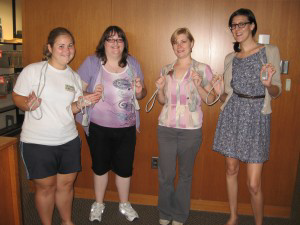Are you sick of trying to plug your laptop or notebook into a wall socket and coming up short? Want to put an
end to having to rearrange the furniture to reach an electrical outlet in the JKM Library? Then come to the
Circulation Desk with your Chatham ID and check out an extension cord! You can check out an extension cord
for 4 hours with one 4 hour renewal (for use in the Library only). No heavy lifting required!
Commenting on blog posts requires an account.
Login is required to interact with this comment. Please and try again.
If you do not have an account, Register Now.
 August 2011
August 2011
The JKM Library has added yet another database: Science Direct – Health & Life Sciences Journal Collection! This collection will be useful to students, faculty, and staff interested in the fields of biological & agricultural sciences, biochemistry, genetics, molecular biology, environmental science, nursing, physical therapy, occupational therapy, and more. Please be aware that while this database contains almost 1,000 full-text journals, it is not entirely full-text. You will get results from books in your search, but the library does not subscribe to any of those. However, you can check our catalog to see if we have them in print, or order them through E-ZBorrow. If there’s an article you want that’s not available full-text, order it through Interlibrary Loan!



Each year Chatham University chooses a country or region of the
world to explore during the academic year for Global Focus Year of…. This year the area of choice is Southeast
Asia: Vietnam. Vietnam is a rich and complex country with a long history of trade, colonialism, conflict, war,
and resistance.
As Americans we often first relate to Vietnam through the lens of the Vietnam War. The images and reporting on
the war in Vietnam are some of the most powerful in history. The counter movements in the United States
protesting the war are also an integral part of the history. The atrocities of the war and the uprising of Vietnamese
peasants inspired many Americans to stage protests, refuse the draft, and join international organizations.
Vietnam’s fight for independence has been a many centuries’ long struggle. In 111 BCE, the Chinese Han
Dynasty consolidated Nanyue, the ancient kingdom, into their empire. In the 10th century Vietnam regained
independence but civil fighting remained. In the 19th century France colonized much of the Asian peninsula,
including Vietnam, and imposed Western culture and religion on the countries. During this time the famous
Marxist Ho Chi Mihn called for independence, leading to the Viet Mihn and the First Indochine War. In 1954,
Vietnam was split in two, with the Communist faction moving to the North, and Ngo Dinh Diem named Prime
Minster of the South. The split was intended to quell fighting pending elections; these elections never happened,
setting in motion fear of a Communist takeover and the American intervention in the country.
The Vietnam War was in many ways a major shock to America. The use of guerrilla war tactics by the rebels,
unilateral political strategies, the use of chemical warfare that decimated people, land, and livestock, and
coverage by journalists was like nothing seen before. The counter-war movement led to violent and peaceful
protests. American soldiers took a double blow suffering the images of war and a cold reception at home. In
1976, Saigon fell.
The aftermath of the war left the country in ruin, but the Vietnamese people remained strong, many seeking
asylum in the country that hurt them. Today Vietnamese culture is rich in America and Southeast Asia a strong
player in foreign trade and travel. Vietnam is a country rich in folklore, martial art tradition, art, architecture,
and of course, food. The books on display are just some of many at the library, browse the catalog or ask a
librarian for more.
~Display and blog post by Donna Guerin, Reference Associate
Commenting on blog posts requires an account.
Login is required to interact with this comment. Please and try again.
If you do not have an account, Register Now.